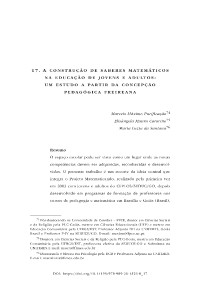Please use this identifier to cite or link to this item:
https://hdl.handle.net/10316.2/41306| DC Field | Value | Language |
|---|---|---|
| dc.contributor.author | Purificação, Marcelo Máximo | |
| dc.contributor.author | Catarino, Elisângela Maura | |
| dc.contributor.author | Santana, Maria Luzia da | |
| dc.date.accessioned | 2017-04-06T09:12:08Z | |
| dc.date.accessioned | 2020-09-08T12:01:59Z | - |
| dc.date.available | 2017-04-06T09:12:08Z | |
| dc.date.available | 2020-09-08T12:01:59Z | - |
| dc.date.issued | 2017 | - |
| dc.identifier.isbn | 978-989-26-1325-3 | |
| dc.identifier.isbn | 978-989-26-1326-0 (PDF) | |
| dc.identifier.uri | https://hdl.handle.net/10316.2/41306 | - |
| dc.description.abstract | School spaces can be conceived as places where new skills may be developed. This paper is one of the products of the Project “Matematicando”, which was started in 2003 with youth and adults of CEPLOS/SEDUC/GO and, later, developed under teacher education programs in Pegagogy and Math courses in Brasília and Goiás (Brazil). The aim was to propose new students in higher education a threshold level in math and pedagogical knowledge. With this objective, the Project was developed under some threshold programs in different institutions. In 2014/2, the Project was developed through the Pro‑‑Rectory of Public Outreach of the Universidade Estadual de Goiás (UEG – State University of Goiás), in the Mineiros Campus. Today it is developed in UNIFIMES with the initial name “matematicando”. In this new phase of implementation, the Project aims to explore some motivations (life histories – practical and theoretical) that led the students to the university. The starting point of this new stage of the Project is the study and the detailed analysis of some teachers’ successful pedagogical praxis, combining with them the socio‑‑cultural construction of the Brazilian people, from the critical and reflective approach based on Freire’s conceptions. In the academic world, where young people and adults come together, good communication between teachers and students can be an effective tool to build the critical and reflective thinking that reinforces motivation and learning, once dialogical relationships motivate students and promote their development in the process. Within this frame, this study analyses Paulo Freire’s concepts of popular education and critical pedagogy, highlighting possible bonds between popular education and critical education for freedom and for the construction of mathematical knowledge of new students in higher education. | eng |
| dc.description.abstract | O espaço escolar pode ser visto como um lugar onde as novas competências devem ser adquiridas, reconhecidas e desenvolvidas. O presente trabalho é um recorte da ideia central que integra o Projeto Matematicando, realizado pela primeira vez em 2003 com jovens e adultos do CEPLOS/SEDUC/GO, depois desenvolvido em programas de formação de professores nos cursos de pedagogia e matemática em Brasília e Goiás (Brasil). Nesse contexto, o objetivo era propor aos alunos ingressantes no ensino superior, um nivelamento nos conteúdos pedagógicos e matemáticos, e com isso, o projeto foi executado dentro de alguns programas de nivelamentos, em instituições diferentes. Em 2014/2, o projeto foi desenvolvido junto a Pró‑‑reitora de Extensão da Universidade Estadual de Goiás – UEG, no Campus de Mineiros, e hoje (2015) na UNIFIMES, voltando a ser executado com o nome inicial ‑‑ matematicando. Nessa nova fase de execução, o projeto tem como prioridade, dissertar sobre algumas motivações (histórias de vidas – prática e teóricas) que conduziram os alunos até a Universidade. O ponto de partida para essa nova etapa do projeto é o estudo e a análise detalhada de práxis pedagógicas de sucessos desenvolvidas por alguns professores, aliando a essas, a construção sociocultural do povo brasileiro, a partir do viés crítico e reflexivo, tendo como aparato as concepções freireanas. No universo acadêmico, constituído por jovens e adultos, a boa comunicação entre professores e alunos, pode ser um instrumento eficaz na construção do pensamento crítico e reflexivo que reforça a motivação e a aprendizagem, pois, as relações dialogais motivam o alunado e promovem o seu desenvolvimento no processo. Isto dito fica explícito o objetivo do presente texto, que é analisar os conceitos de educação popular e pedagogia crítica, propagados por Paulo Freire, pontuando os possíveis liames entre a educação popular, educação crítica e emancipatória para construção do conhecimento matemático dos alunos calouros no ensino superior. | por |
| dc.language.iso | por | - |
| dc.publisher | Imprensa da Universidade de Coimbra | por |
| dc.relation.ispartof | http://hdl.handle.net/10316.2/41289 | por |
| dc.rights | open access | - |
| dc.title | A construção de saberes matemáticos na educação de jovens e adultos: um estudo a partir da concepção pedagógica freireana | por |
| dc.type | bookPart | por |
| uc.publication.firstPage | 369 | - |
| uc.publication.lastPage | 391 | - |
| uc.publication.location | Coimbra | por |
| dc.identifier.doi | 10.14195/978‑ 989‑ 26‑ 1326-0_17 | - |
| uc.publication.digCollection | PB | por |
| uc.publication.orderno | 17 | - |
| uc.publication.area | Ciências Sociais | por |
| uc.publication.bookTitle | Diálogos Freireanos: a educação e formação de jovens e adultos em Portugal e no Brasil | - |
| uc.publication.manifest | https://dl.uc.pt/json/iiif/10316.2/41306/204776/manifest?manifest=/json/iiif/10316.2/41306/204776/manifest | - |
| uc.publication.thumbnail | https://dl.uc.pt/retrieve/11067283 | - |
| uc.publication.parentItemId | 54669 | - |
| uc.itemId | 68967 | - |
| item.fulltext | With Fulltext | - |
| item.grantfulltext | open | - |
| Appears in Collections: | Diálogos Freireanos: a educação e formação de jovens e adultos em Portugal e no Brasil | |
Files in This Item:
| File | Description | Size | Format | |
|---|---|---|---|---|
| a_construcao_de_saberes_matematicos_na_educacao_de_jovens_e_adultos.__um_estudo_a_partir_da_concepcao_pedagogica_freireana.pdf | 1.83 MB | Adobe PDF |  |
Items in DSpace are protected by copyright, with all rights reserved, unless otherwise indicated.
